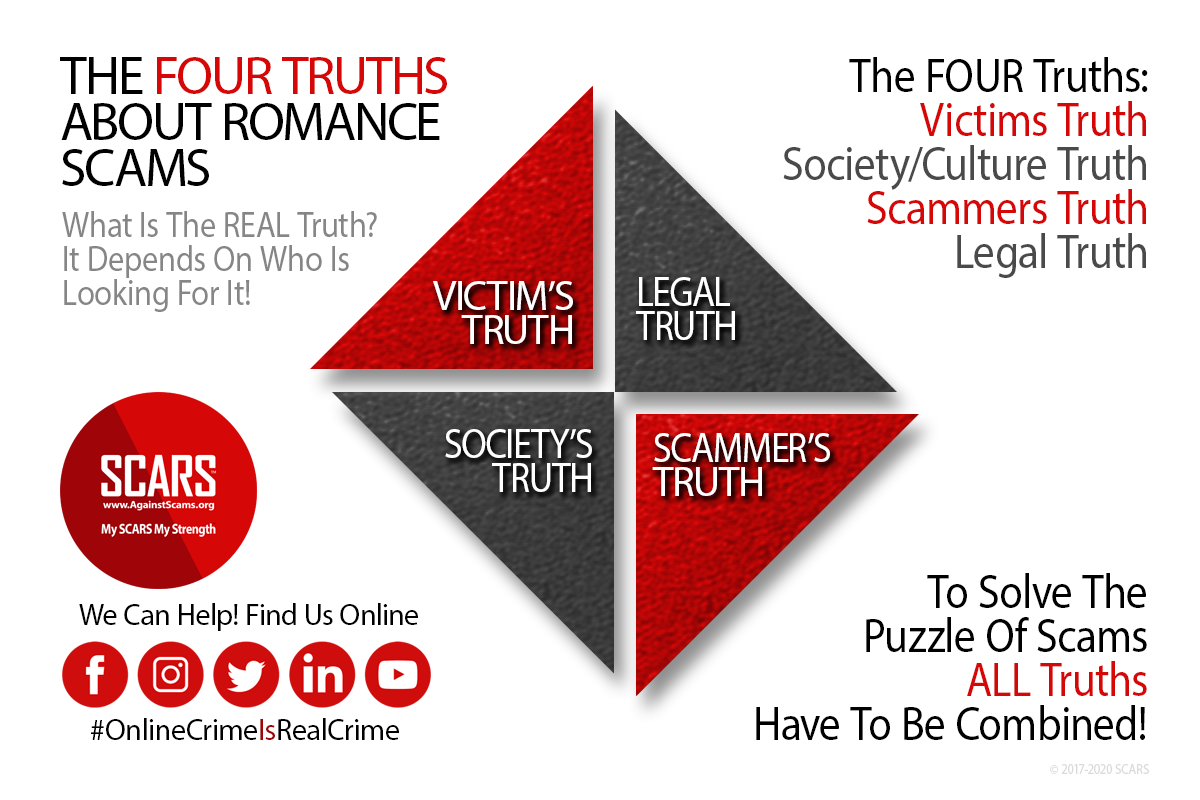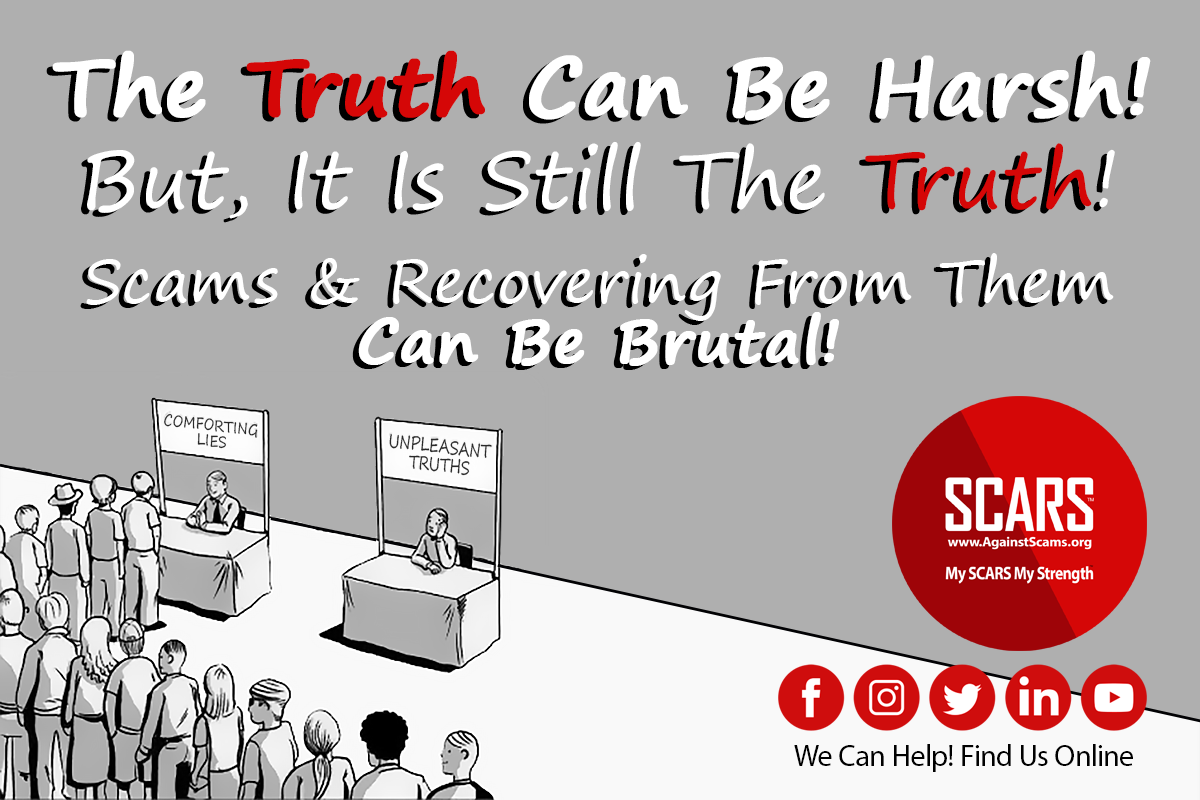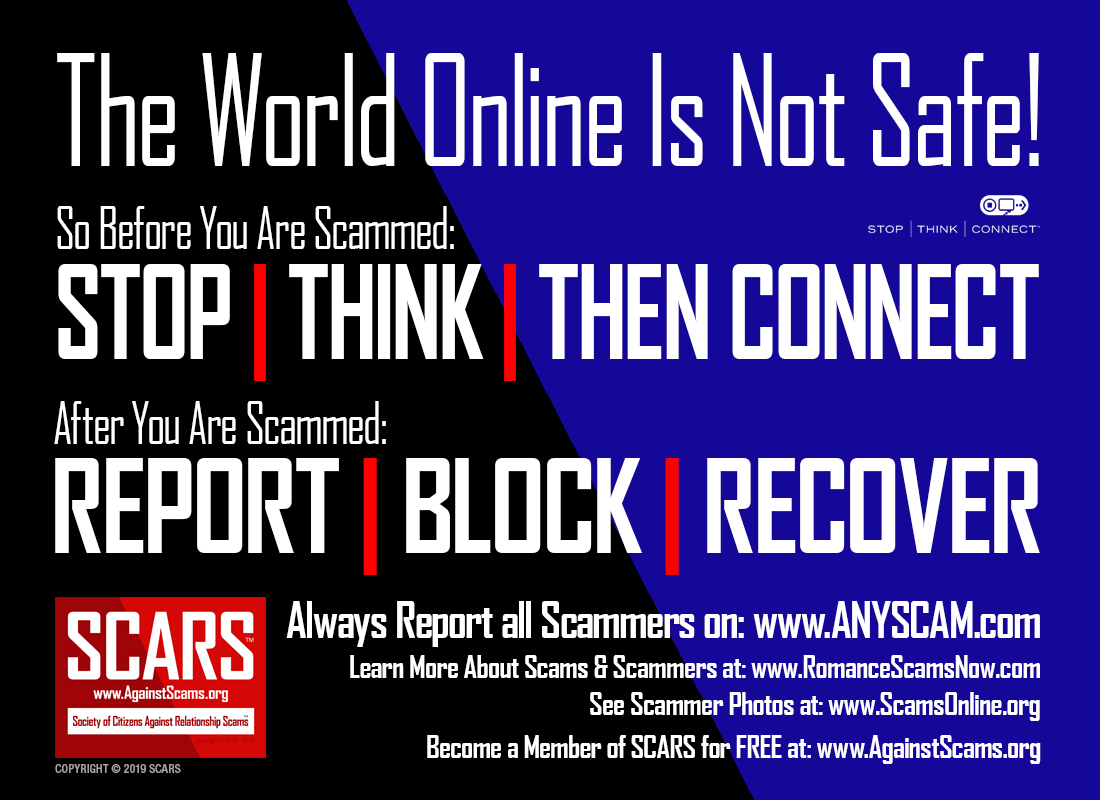The Hardest Subject – The Truth
Originally published in 2017 – Updated December 2020
When it comes to Romance Scams there is no ONE TRUTH
There are actually FOUR TRUTHS
- The Victim’s Truth
- The Scammer’s Truth
- Law Enforcement’s Truth
- Society’s Truth
What are these and why are they different?
You, who are visiting this page are probably a scam victim. That means you feel wronged, You feel like you were taken advantage of, and nobody cares or understands. Right?
That is a part of your truth.
Let’s explore each of these truths and see what perspective they provide. In order for you to recover fully, you have to be able to understand and accept all four truths, regardless of how hard it may be.
Warning: This is not going to be a sugar coating for wounded sensibilities. This is going to be bold brutal hard and in your face truth. This is going to share why others feel the way they do and why they look at you the way they do. Hopefully you can see the truth in this and accept it as a part of the reality that you find yourself within now that you have been scammed.
Let’s Start with the VICTIM’S Truth
- You were scammed
- You may or may not have lost money – if you did it was probably money you could not afford, and hate yourself for throwing it away
- You were lied to and you believed it – how could someone do that to you?
- All you wanted was love and yet you only found lies
- You trusted the other person and they betrayed you
- You did nothing wrong, you are the victim
You found a kindred soul online and you trusted them, and they took advantage of you.
Now you are depressed, angry, want revenge, and hate yourself for being the fool. You need someone to do something to: get your money back, and to see the scammer punished. Someone, anyone to save you!
No one cares. No one will do anything. As much as you ask for help, people just will not do what you need done.
No one understands. You can’t talk to people you know – your family or your friends just refuse to accept what happened – that you did nothing wrong. They think it is your fault.
Is that about right? Is that your perspective?
Now let’s look at the SCAMMER’S TRUTH
- The victim has money and can afford to give it up
- The scammer did not steal the money, the victim gave it to them willingly
- There was no violence, the victim paid them for a fantasy, just like a movie
- All the scammer provided was theater, helping the victim live a little, feel a little emotion, climb out of the decadent shell
- The scammer made the victim feel good for a while and was paid for it
- The scammer has a family to feed and the victim can afford it – they are rich
- The victim willingly participated and lied to others about it, they are just as guilty
- The victim is to blame – if they didn’t let the scammer in nothing would have happened
- The victims live in countries that stole from Africa and deserve it
- The scammer is not committing a crime – they are performing a service
The scammers have no moral problems with committing scams.
They feel fully justified in taking money that the victims willingly send to them. If the victim did not want to, no one forced them to do anything. The victims lied about their relationship to friends and family, and even to Western Union.
Now let’s look at the LAW ENFORCEMENT’S TRUTH
- Victims willingly disregarded their own safety
- Victims willfully engaged in unsafe behavior and became addicted to the fantasy they were believing
- Victims behaved like addicts and hid their relationship and lied to family and friends
- Victims engaged in international bank and money transfer fraud
- Most victims do not even bother to report the crimes
- Most victims do not even maintain the information needed to investigate the crime
- Many victims act as willing accomplices in money laundering or other criminal activities as a mule
- Victims bring this on themselves and then stand back and let the scammers get away with it
- Victims hide behind their embarrassment instead of doing the right thing
Of course, not all of these are true for every victim, but in almost every case more than half are.
The fact is that more than 95% of victims make little effort to report these crimes. There are always excuses: no one cares, no one will listen, nothing will ever happen, they are too embarrassed. But if no one ever reports it, how does the government know how big this really is? Why should the government give precious resources to something that even the victims will not pursue?
Now let’s look at SOCIETY’S TRUTH
- Victims are lonely people that just don’t use common sense
- Victims always invite the scammers into their lives
- Victims never listen to the warnings that are everywhere and believe it will never happen to them
- Victims are responsible for the growth in online cybercrime
- Victims whine and complain but don’t even report the crimes most of the time
- Victims live in total denial even after they have been shown the truth
- Many victims actually help scammers defraud others
- Victims lie to their banks and money transfer services engaging in criminal money laundering
- No victim was ever forced to send money or believe any scam
- Victims are addicts that refuse to deal with their real problems
This is not a pretty picture. People who have never been scammed just do not understand, but the fact is that their perceptions are based in fact. It is not that simple, but few victims do anything to help society understand.
Society sees an endless stream of warnings and fake faces and cannot understand how someone could be that stupid to believe the incredibly false fantasies that scammers create.
SO WHAT ARE WE ALL TO DO?
These are the simple realities, and until these change the scammers will continue to get away with it; society and law enforcement will not fully take the side of the victims and do whatever it takes to end this. And victims will continue to struggle to recover and be heard.
It all starts and ends with the Victims
YOU ARE THE ONE THAT MUST CHANGE TO MAKE THIS STOP
- Victims must get over their shame and be vocal about what happened to them – cancer victims used to hide as well, but today we celebrate cancer survivors – so get over it and get active (at the very least join SCARS).
- Get rid of the anger – this single attitude is the reason most support turns away from you. You need help, but stop biting the hand that supports you. Stop feeling entitled to have the world save you. Accept that you are responsible for your own situation, and work with the real tools that are available to you.
- Stop believing in fantasies – that includes ridiculous anti-scam gurus that promise impossible things. The money is gone, and not one anti-scam group (including SCARS) can guarantee an arrest. If you continue to look for fantastic easy answers you will just go from one scam to another.
- Get up and make the effort to report scammers properly. Yes you might have to report them in three places: Local police, National police, and on Anyscam.com – stop complaining and do it. If you sent money through a money transfer service, admit you we scammed and report to them properly too. You don’t get to stop just because it is hard.
- Stop pretending you are an expert in scams because you were scammed. Learn the reality of this, and help others avoid scams by SHARING information. Talk to your friends and family about what happened to you, help them understand that you made mistakes by accepting responsibility for what you did, they will both recognize your truth and support you because of it – no one respects someone that continues to live in denial.
- Recognize that you need help to recover. Scams ARE an addiction for most victims, and just like addictions it takes a formalized process to fully recover. Yes it may be embarrassing but it is necessary for your health.
- Stop looking for love online. Stop connecting with strangers and letting them into your life. This one single thing will stop almost all scams dead in their tracks. At least stop until you have the skills you need to stay safe.
Support can come in many different forms and different ways. We provide formal support groups, but coming out to your family can also help provide support and a path to recovery. If gays and lesbians can do it, so can you!
None Of This Is Easy!
But remember one simple truth – you started yourself on this path. Now you have to take yourself off of it and follow a new path. If you do not do this, it will just happen over and over.
This is a brutal place you find yourself in.
You are not the first, and you will not be the last, but how long it takes YOU to recover is entirely up to you. You also have the power to save others who do not read the warnings and believe it will never happen to them, just as you didn’t believe it either. Make them believe, it is your responsibility.
You were a victim, now accept it and become a survivor.
Survivors can be proud of their accomplishment and their recovery.
Which are you?
Victim or Survivor?
Complainer or Action Hero?
TAGS: SCARS, The Truth, Information About Scams, Anti-Scam, Scams, Scammers, Fraudsters, Cybercrime, Crybercriminals, Romance Scams, Scam Victims,
SCARS™ Team
Society of Citizens Against Relationship Scams Inc.
A Worldwide Crime Victims Assistance Nonprofit Organization
Visit: www.AgainstScams.org
Contact Us: Contact@AgainstScams.org
PLEASE SHARE OUR ARTICLES WITH YOUR FRIENDS & FAMILY
HELP OTHERS STAY SAFE ONLINE – YOUR KNOWLEDGE CAN MAKE THE DIFFERENCE!
The Latest SCARS Posts:
FIND MORE SCAM NEWS
«SCAMCRIME.COM»
JOIN US ON FACEBOOK
«CLICK HERE»
END
MORE INFORMATION
– – –
Tell us about your experiences with Romance Scammers in our
« Scams Discussion Forum on Facebook »
– – –
FAQ: How Do You Properly Report Scammers?
It is essential that law enforcement knows about scams & scammers, even though there is nothing (in most cases) that they can do.
Always report scams involving money lost or where you received money to:
- Local Police – ask them to take an “informational” police report – say you need it for your insurance
- U.S. State Police (if you live in the U.S.) – they will take the matter more seriously and provide you with more help than local police
- Your National Police or FBI « www.IC3.gov »
- The SCARS|CDN™ Cybercriminal Data Network – Worldwide Reporting Network on « www.Anyscam.com »
This helps your government understand the problem, and allows law enforcement to add scammers on watch lists worldwide.
– – –
To learn more about SCARS visit « www.AgainstScams.org »
Please be sure to report all scammers
on « www.Anyscam.com »
Disclaimer:
SCARS IS A DIGITAL PUBLISHER AND DOES NOT OFFER HEALTH OR MEDICAL ADVICE, LEGAL ADVICE, FINANCIAL ADVICE, OR SERVICES THAT SCARS IS NOT LICENSED OR REGISTERED TO PERFORM.
IF YOU’RE FACING A MEDICAL EMERGENCY, CALL YOUR LOCAL EMERGENCY SERVICES IMMEDIATELY, OR VISIT THE NEAREST EMERGENCY ROOM OR URGENT CARE CENTER. YOU SHOULD CONSULT YOUR HEALTHCARE PROVIDER BEFORE FOLLOWING ANY MEDICALLY RELATED INFORMATION PRESENTED ON OUR PAGES.
ALWAYS CONSULT A LICENSED ATTORNEY FOR ANY ADVICE REGARDING LEGAL MATTERS.
A LICENSED FINANCIAL OR TAX PROFESSIONAL SHOULD BE CONSULTED BEFORE ACTING ON ANY INFORMATION RELATING TO YOUR PERSONAL FINANCES OR TAX RELATED ISSUES AND INFORMATION.
This content and other material contained on the website, apps, newsletter, and products (“Content”), is general in nature and for informational purposes only and does not constitute medical, legal, or financial advice; the Content is not intended to be a substitute for licensed or regulated professional advice. Always consult your doctor or other qualified healthcare provider, lawyer, financial, or tax professional with any questions you may have regarding the educational information contained herein. SCARS makes no guarantees about the efficacy of information described on or in SCARS’ Content. The information contained is subject to change and is not intended to cover all possible situations or effects. SCARS does not recommend or endorse any specific professional or care provider, product, service, or other information that may be mentioned in SCARS’ websites, apps, and Content unless explicitly identified as such.
The disclaimers herein are provided on this page for ease of reference. These disclaimers supplement and are a part of SCARS’ website’s Terms of Use.
Legal Notices:
All original content is Copyright © 1991 – 2020 Society of Citizens Against Relationship Scams Inc. (D.B.A SCARS) All Rights Reserved Worldwide & Webwide. Third-party copyrights acknowledge.
SCARS, SCARS|INTERNATIONAL, SCARS, SCARS|SUPPORT, SCARS, RSN, Romance Scams Now, SCARS|INTERNATION, SCARS|WORLDWIDE, SCARS|GLOBAL, SCARS, Society of Citizens Against Relationship Scams, Society of Citizens Against Romance Scams, SCARS|ANYSCAM, Project Anyscam, Anyscam, SCARS|GOFCH, GOFCH, SCARS|CHINA, SCARS|CDN, SCARS|UK, SCARS|LATINOAMERICA, SCARS|MEMBER, SCARS|VOLUNTEER, SCARS Cybercriminal Data Network, Cobalt Alert, Scam Victims Support Group, are all trademarks of Society of Citizens Against Relationship Scams Inc., All Rights Reserved Worldwide
Contact the law firm for the Society of Citizens Against Relationship Scams Incorporated by email at legal@AgainstScams.org













Thanks for all your hard work bringing awareness to this MASSIVE issue! No sugar coating required!!
All of our employees and volunteers sincerely appreciate your praise!